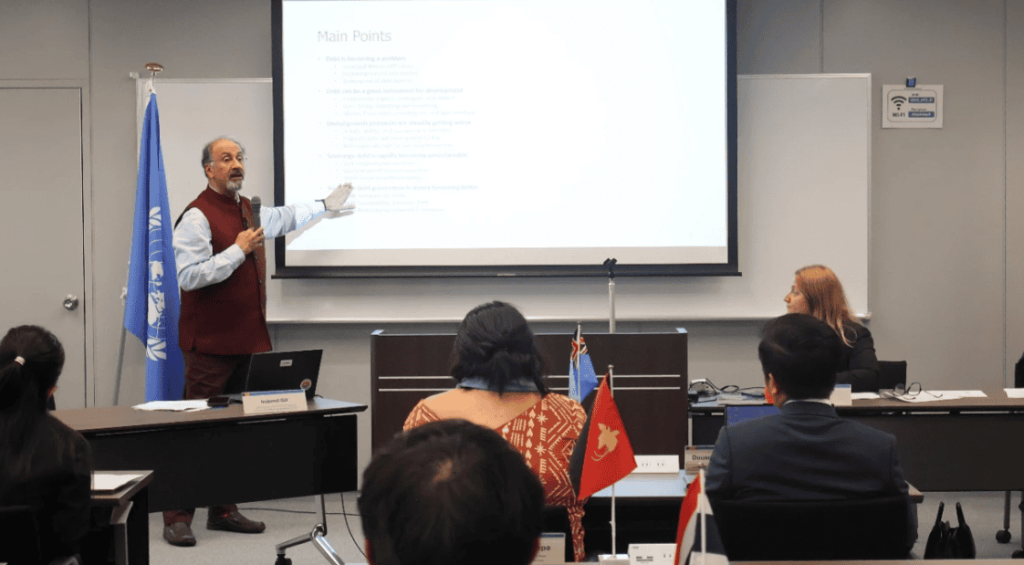As the world continues to emerge from the COVID-19 pandemic and its aftermath, countries face new and unexpected challenges. Elevated debt levels, persistent inflation, and weakened growth prospects have created a perfect storm of financial pressure. For many nations, this has meant shrinking the budgets in vital sectors like health, education, and the environment. In this context, accurate, timely, and comprehensive debt data is more critical than ever.
Against this backdrop, the World Bank Debt Statistics Team and the Institute for Economic Development organized the workshop entitled Enhancing External Debt Statistics for Greater Transparency and Sustainability. Held in April in Chiba, Japan, and hosted by the United Nations Statistical Institute for Asia and the Pacific with generous support from the government of Japan, the workshop brought together a dynamic group of debt management professionals and central bankers from across the East Asia and Pacific region.
The five-day workshop served as both a technical deep dive and a strategic dialogue on the evolving debt ecosystem, drawing on the World Bank’s Debtor Reporting System (DRS) and international standards for compiling debt data. Participants explored the gaps and discrepancies that can undermine debt sustainability, complicate restructuring efforts, and the need to improve transparency and resilience in their own debt reporting processes.
A comprehensive and collaborative learning experience

Designed to be immersive and interactive, the program combined expert-led lectures, peer learning, and real-world simulations. Highlights included:
- Core debt definitions, classifications, and concepts, aligned with updated standards from the International System of National Accounts and Balance of Payments;
- Practical use of the redesigned World Bank Debtor Reporting System, including new classifications of debt instruments and creditors;
- Identification and management of contingent liabilities, including nonguaranteed borrowing by state-owned enterprises;
- Introduction to debt sustainability frameworks and tools;
- World Bank policies and actions supporting countries in or at risk of debt distress; and
- Standards for recording and reporting debt obligations, which improve the quality and usability of data.
World Bank Senior Vice President and Chief Economist Indermit Gill opened the workshop with a compelling keynote message emphasizing the critical importance of debt sustainability and transparency in today’s rapidly evolving economic environment. He highlighted how these principles are not merely technical requirements but serve as the foundation for sound economic management, as they enhance fiscal accountability and ensure that borrowing remains aligned with long-term development goals.
The program also included a session on the debt transparency agenda, during which the roles of key stakeholders in advancing this critical initiative were outlined. Takahiro Tsuda (Director of the Multilateral Development Banks Division at the International Bureau, Ministry of Finance, Government of Japan) highlighted Japan’s commitment in this area as an advocate for debt transparency, particularly through its engagement with international financial institutions. As an active member of the G7, G20, and the Paris Club, Japan has championed greater debt data disclosure by bilateral creditors and supported debt management programs—especially in low- and middle-income countries.

The workshop ended with a forward-looking session on sustainable financing, focusing on the World Bank’s Sustainable Development Finance Policy (SDFP) and the evolving global debt landscape.
From knowledge-sharing to real world impact

What set this workshop apart was its strong focus on customization according to local contexts. Modules were delivered by World Bank debt statistics experts who combined definitions and classifications on debt statistics following international standards with real-life case studies from countries. Experts on debt statistics and debt systems from the IMF, the Commonwealth Secretariat, and UN Trade and Development talked about knowledge-based international standards and debt management matters.
Professionals from debt management offices, central banks, and experts on debt statistics engaged in group discussions and simulations, exchanging insights on how to apply new methodologies within their local contexts. This spirit of peer learning fostered a dynamic environment to discuss challenges, ideas, and new solutions.
Beyond theory, the workshop also emphasized practical application by providing participants with useful tools – including templates, quizzes, and other resources – that they could immediately integrate into their day-to-day debt management and reporting processes.
Partnering with countries to improve debt transparency
At its core, the workshop reflects a deep commitment to partnering with countries to empower them with the tools and knowledge needed to navigate today’s complex debt environment. By investing in people and leveraging new connections and ideas, we’re helping countries strengthen their economic resilience from the inside out.
This is just the beginning as we continue expanding our support for countries striving to improve debt transparency and sustainability. More workshops, new regions, and more opportunities for collaboration lie ahead. Stay tuned for upcoming opportunities!
Source : World Bank







































































